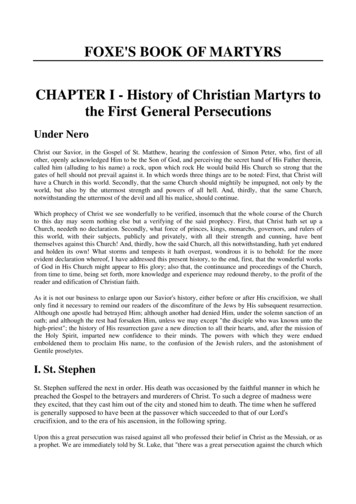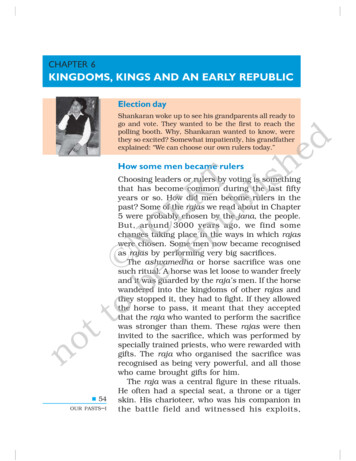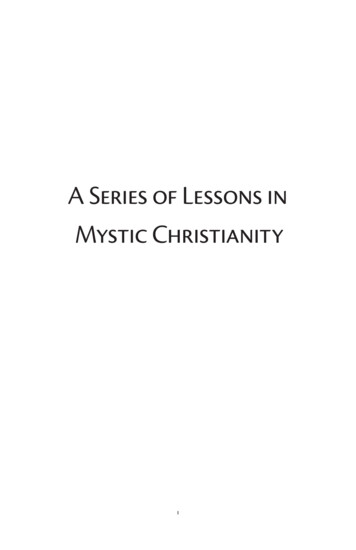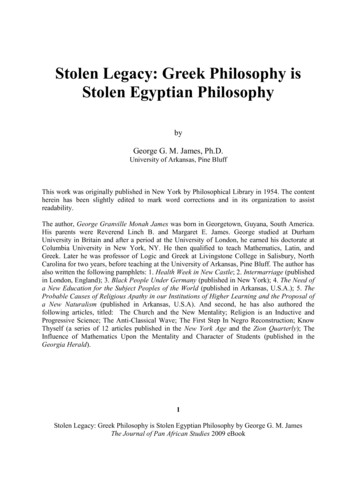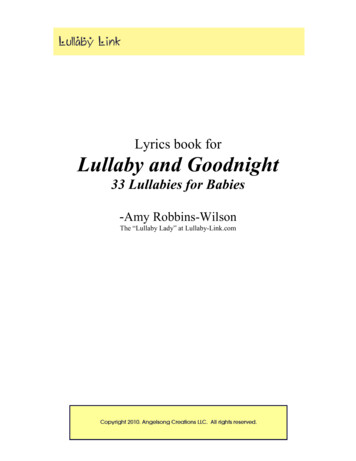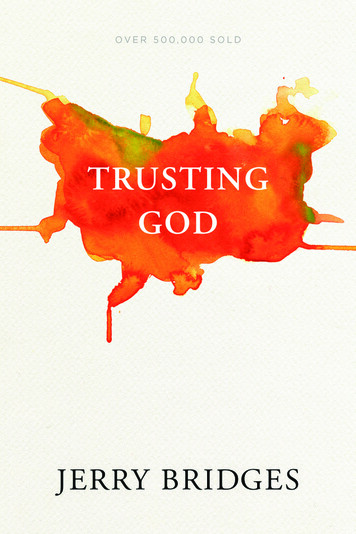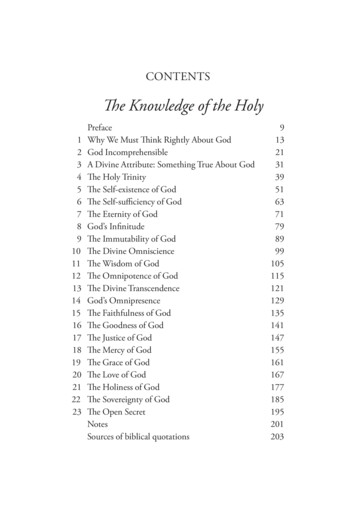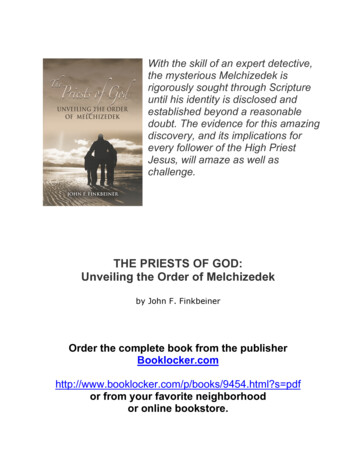
Transcription
With the skill of an expert detective,the mysterious Melchizedek isrigorously sought through Scriptureuntil his identity is disclosed andestablished beyond a reasonabledoubt. The evidence for this amazingdiscovery, and its implications forevery follower of the High PriestJesus, will amaze as well aschallenge.THE PRIESTS OF GOD:Unveiling the Order of Melchizedekby John F. FinkbeinerOrder the complete book from the /books/9454.html?s pdfor from your favorite neighborhoodor online bookstore.
Copyright John F. Finkbeiner, July 2017ISBN: 978-1-63492-586-0All rights reserved. No part of this manuscript may be reproduced inany format or by any electronic or mechanical means without writtenpermission from the author and/or publisher, except by a reviewerwho may quote brief passages in a review.Published by BookLocker.com, Inc., St. Petersburg, Florida, U.S.A.BookLocker.com, Inc. 2017,1st Ed., July 2017; 2nd Ed., January 2018Printed on acid-free paper.Unless otherwise indicated, Scripture taken from the HOLY BIBLE,NEW INTERNATIONAL VERSION (NIV), Copyright 1973, 1978,1984 by International Bible Society. Used by permission of ZondervanPublishing House. All rights reserved.Unless otherwise indicated, all bold type scripture is the author’semphasis. All rights reserved.Visit theprophetsofgod.com blog and join in the interaction.To contact the writer of The Priests of God:John Finkbeiner the eirene groupP.O. Box 694Mercer, PA 16137Cover: Engel CreativeCover photo: KathleenInside cover illustration: clipartof.com
Table of ContentsFOREWORD . VIIINTRODUCTION . 1PART ONE THE PRIEST OF GOD . 3-1- PRIESTS . 5-2- THE ALTAR. 19-3- CLEAN AND PURE . 33-4- THE TEMPLE . 47-5- ENFORCERS . 61-6- IDOLS . 75-7- MESSENGERS . 89PART TWO MELCHIZEDEK, THE MAN. 103-8- MELCHIZEDEK . 105-9- THE SEARCH . 119-10- FLAWED . 133-11- REFINED GOLD . 147-12- HIDDEN . 161-13- W ORM . 175-14- DESCENDANTS . 189PART THREE THE ORDER OF MELCHIZEDEK . 203-15- JETHRO . 205-16- DAUGHTERS OF ZION . 219-17- FALLEN PRIESTS . 233-18- LAMBS . 247-19- LIVING SACRIFICES . 261v
MORE NEW TESTAMENT SCRIPTURES SUPPORTING THEDOCTRINE OF SUFFERING . 274-20- HOLY SERVANTS . 277-21- EVERLASTING . 291-22- CHOSEN (FINAL THOUGHTS) . 305ACKNOWLEDGMENTS . 309vi
-1Priests*The service is about to end. The priest, with hands raised, facesthe people and offers a benediction: “The Lord bless you and keepyou. The Lord make his face to shine upon you and be gracious toyou. The Lord lift up his countenance and grant you peace.”During Israel’s exodus from Egypt, God taught Moses, his servant,the above benediction (Numbers 6:22). With the Creator’s blessing,the people departed, returning to their tents in peace.The Lord chose Moses and his brother Aaron to stand betweenheaven’s throne and their family, Jacob’s offspring. We will learn inthe following how Moses performed priestly functions, yet never borethe title. With God’s servants, titles are superfluous. It has alwaysbeen about their actions. A priest of God is known by their fruit, not bytheir clothing, education or by titles and honors bestowed by men.Aaron, like Moses, was of the tribe of Levi. God appointed him tocarry out his instructions for worship. As chief mediator for God andman, Aaron was chosen to be Israel’s “high priest.”Go-betweenGod’s thoughts are timeless. Anyone who ignores, neglects orattempts to alter what the Lord decrees, would be making a veryfoolish mistake. Priests, or ordained mediators, exemplify the eternal.Priests were created to stand between and represent God to men andmen to God. Nothing the Lord makes will ever disappear.I know that everything God does will endure forever; nothingcan be added to it and nothing taken from it. God does it so thatmen will revere him.Ecclesiastes 3:14In 1903, on a flat stretch of sandy ground near Kitty Hawk, NorthCarolina (U.S.), Wilbur and Orville Wright, successfully flew the firstairplane. Aviation’s pioneers were more intent on building a pilotcontrolled, heavier-than-air flying machine, than giving it a name.Pressed to call it something afterward, the brothers referred to theirinvention as “the Wright Flyer.”5
The Priests of GodTo this day, no one has equaled the feat of the Wright’s flyingmachine or made a perfect reproduction, but every plane or jet builtsince owes its design to the Wrights’ genius. The Flyer came first.Aaron was not the original priest. In Genesis 14, we find the first,the prototype, a man who is to priests what the Wright Flyer is tomanned flight. Almost as brief as the flight at Kitty Hawk, a priest ofGod stepped into history, several centuries before Aaron.“Then Melchizedek, king of Salem brought out bread andwine. He was priest of God Most High ” (Genesis 14:18)As a holy man, Melchizedek stood out. He blessed Abram onGod’s behalf. (The bread and wine he served have meaning assymbols of Christ’s sacrifice.) This mysterious figure stood in the gap.He blessed God Most High, then turned and blessed Abram. “ThenAbram gave him a tenth of everything.” (Genesis 14:20b)Melchizedek, the person to whom Abram paid a tithe (tenth), wasthe first to bear the title of “priest.” But was he the first go-between?Like birds on the wing to the Wrights, we look to heaven for the modelfrom which all other priests are copies. (Later, we will have a lot moreto say about Melchizedek.)The Slayer and the SlainIn Jesus’ day, the chief priest took his place before the altar on theholy day of Passover. Lying bound on the altar was a year-old lamb.It was the choicest of the flock, without spot or blemish. At theappointed time, the animal was slain. The priest was the slayer.Who created blood sacrifices? Our answer is in Revelation 13:8,“Who was the Lamb slain from the foundation of the world?” If theLamb was slain before creation, then who was the Slayer? Who wasthe first to sacrifice a Lamb without spot or blemish? It had to be theFather who offered his own Son for us all (Romans 8:32).We build the foundation for discovery from Genesis. As a fallensteward over God’s creation, Adam constructed an altar. With a slainanimal, our prototype for men worshiped while, presumably, theprototype for all women watched. Forgiveness was granted throughAdam’s sacrifice for this was God’s way. When the first man wasreconciled to God, as representative for his family, Eve and theirchildren were also reconciled. Adam was his family’s high priest;therefore, he was appointed the slayer.6
PriestsAfter “the fall,” death entered the world. With the knowledge theyacquired from the forbidden fruit, the first couple saw they were naked.It was God who covered them with skins to remove their shame(Genesis 3:21). The first death was an innocent animal. To restoreAdam and Eve’s fellowship, the innocence of the slain was necessary.Who was it that reconciled Adam and Eve to God? It was He, the Onewho was sacrificed before the foundation of the world.Later, in Genesis 4, we meet Cain and Abel, sons of Adam andEve. Abel’s sacrifice replicated his father’s. Abel was the slayer. Heoffered the Lord the fat portions from the choicest of his lambs, apleasing aroma in God’s nostrils. From on high, Abel’s sacrifice waslooked upon with favor (Genesis 4:4). (Was it because he followed thedivine pattern?) To find forgiveness, Abel knew God required a bloodsacrifice from an unblemished lamb.Cain, however, met with God’s disapproval. For his sacrifice, hepresented his own invention, a grain offering. If Cain’s objective wasto please God and have his sins blotted out, then he failed. But was ithis aim? The pattern given in the Garden had to be followed. Withoutthe shedding of blood there is no forgiveness for sin (Hebrews 9:22).Since Adam and his family were sinful, the Lord told them to approachthe Holy only in the manner He prescribed. They would have wives,sons and daughters who also needed to restore their relationship.Cain’s rejection of God’s way was folly. Deviations from the prototypeare futile. In fact, Cain’s actions were rebellious.By following God’s example, Abel was blessed. He waspronounced justified. Sin was taken away and fellowship restored. Forhis obedience and martyr’s death, Abel was blessed to be the firstlisted in “Faith’s Hall of Fame” (Hebrews 11:4). His righteous bloodstill testifies today. Cain may have been repulsed by the thought oftaking an animal’s life, but apparently not by shedding the blood of hisbrother. Sin’s penalty was never to be lost. The substitute’s hand laidon the sacrifice, then the knife, was a needful reminder of God’s wrathon sin. The priest/slayer made the connection as no one else could.Go-betweens lived on because the guiltless sacrifice died in theirstead. Through the horrific death of crucifixion, forgiveness for sinswas accomplished. To the Father, nothing other than His Son, thePerfect Lamb, was acceptable. It is never out of His mind.Was the earth full of violence because Cain’s way wasperpetuated by his seed? Shedding human blood rather than that of7
The Priests of Godanimals was the example Cain gave his offspring. Through Seth,Adam’s faithful son, God preserved a remnant. They honored the Lordby sacrificing spotless animals as an atonement for sin. God forgavethem and restored Seth’s family and offspring to fellowship.As it was in Noah’s day, it is today. Altars without penitent sinnersand “Cross-less” religion substitute for God-ordained worship. Inmany churches and cathedrals, we have the feel of a mausoleum. Therounded roofs of Mosques are filling the religious landscape oncedominated by steeples. In Islam, the blood of God’s Son was not shedon a cross 2000 years ago. It was not Jesus, but a substitute whodied, according to their teaching. A few of Islam’s devout lie prostratetoward Mecca prior to a suicide mission. When Calvary is scorned,the world turns to violence. In the Jihadist’s mind, achieving a martyr’sdeath by slaying the innocent earns a ticket to paradise. The Germanproverb is true: “Devils are worshiped at empty altars.”Before the Flood, only a tiny remnant knew the price sin required.At Jesus’ crucifixion, forgiveness was paid. Religionists, horrified atthe thought of an innocent animal laid on an altar, omit the Lord’ssuffering, blood and resurrection. Priests can be duped into believingthat God has alternate means to forgive. Too many know nothing ofCain’s error or of the Lamb’s sacrifice (Colossians 1:20).GuardianOur focus is on God’s design for priests as described in the bookof beginnings. It is important we study the origin of “priest,” “priests,”or “priesthood,” terms used over eight hundred times in Scripture.How else can we know what God intended unless we distinguish thetrue priests of God from the imposters?Since the word “priest” does not surface until Genesis 14:18, acharacteristic of our Creator emerges: To understand the subject, wemust carefully examine their roles. We already mentioned the priestlyfunction of “go-between” and “slayer.” We alluded to another, so let’snow look further into the priest as “Guardian.”The task of a manufacturer’s quality control team is to ensure thatproduction standards are rigorously maintained. If something goeswrong, then quality control will have to answer for it.8
PriestsEvery successful enterprise has a guardian overseeingoperations. If we apply this principle to the spiritual well-being of afamily or a community, we would call the overseer a “priest.”Pastor is a related term, since pastors guard God’s flock. They areshepherds and protectors. They manage the quality of worship. Also,as guardians, they must give an account for keeping the faith pure.They adhere to the formula given Moses, the prophets and apostles.If blessings are to flow to the people, the obedience of guardiansis essential. Decrees are to be obeyed. Priests come and go, butGod’s commands must remain unaltered. Fear God and keep hiscommands, for this is the whole duty of man. (Ecclesiastes 12:13b)In Exodus, God issued his decrees for the family of Jacob. Thefather’s line of male ancestors determined the tribe to whom eachIsraelite belonged. Tribal elders served as guardians.From the line of Levi, God chose Moses to shepherd Israel. SinceGod gave him experience guarding a desert flock, Moses wasprepared to lead His sheep through the wilderness.Moses’ brother Aaron, had a different role. He was worship leader(high priest). His task was to preserve God’s law and follow it to theletter. (The high priest, like a nation’s highest court, was appointed topreserve and protect Israel’s foundation in law.)With responsibility for so many, Moses could not shepherd Israelalone. Heeding his father-in-law Jethro’s advice, he selected judgesor elders. Thereafter, from each tribe, leaders assisted Moses in hisrole of pastoring or guarding the flock (Exodus 18:17-26).Aaron needed help with the priestly burden. Rather than tribalelders, such as Moses had, the high priest’s load was divided amongLevi. Aaron’s sons and other family were to assist in everythingpertaining to worship. According to God, duties were assigned to theclans of Levi. When guardians did their job, all Israel remained holyand blessed. In Genesis through Deuteronomy, duties were detailedso worship could be preserved for future generations.Guarding the Law was closely related to worship. Priests werecharged with teaching God’s commands. Scribes diligently copiedGod’s decrees just as they were given at Sinai.As flame-keepers for the Law, guardians zealously maintained theword of God, so neither a jot nor a tittle (the smallest marks on Hebrew9
The Priests of Godmanuscripts) would be omitted or out of place. Adding to or leavingout was an inexcusable error for a scribe (cf. Proverbs 30:5-6).Today’s guardians labor to accurately convey God’s truth. Theyknow the Bible is the sole source of divine authority. They work tokeep His Word as pure as when He first delivered it to the saints.OfferingsAnother job of the priests was to take charge of the offerings. Withthis responsibility, safeguards were put in place. Only men of integritycould handle the gold and silver. To find out who the guardians were,God administered a test.In Exodus 20, Sinai burned with fire as the Lord spoke. The planwas for the ranking member of each house to be the guardian. If theIsraelites were destined to be a kingdom of priests and a holy nation(Exodus 19:6), then everyone had to know the rules.“I am the LORD your God who brought you out of Egypt, out ofthe land of slavery.”“You shall have no other gods before me.”“You shall not make for yourself an idol in the form ofanything in heaven above or on the earth beneath or in the watersbelow. You shall not bow down to them or worship them; for I, theLORD your God, am a jealous God, punishing the children for thesin of the fathers to the third and fourth generation of those whohate me, but showing love to a thousand generations of those wholove me and keep my commandments.”Exodus 20:2-6From his holy mountain, God gave his Ten Commandments. Toimpress on his people the gravity, Mount Sinai thundered and quaked.All Israel saw lightning. They also heard the trumpet of God. With thisawesome display, men trembled in fear believing they were going todie (Exodus 20:19). Dread came over them. Perhaps it reminded themof the terror Pharaoh instilled in them. That was the idea. If, at theoutset, all Israel learned to hold their God-King in total reverence andawe, then they would not test the Lord by becoming disobedient orrebellious (Exodus 20:20).It was in this context that God repeated his warning about idols.Then the LORD said to Moses, “Tell the Israelites this: ‘Youhave seen for yourselves that I have spoken to you from heaven:10
PriestsDo not make any gods to be alongside me; do not make foryourselves gods of silver or gods of gold.’”Exodus 20:22-23Strict prohibitions regarding idols of gold or silver preceded God’sdirections on worship. In Exodus 25:1-5, Moses received word fromGod on what they were to do with their riches. An offering to the Lordwas to be prepared. The people left Egypt with an abundance of silver,gold, plus articles of fine clothing (Exodus 12:35-36). In Genesis15:14, God revealed to Abram how he would deliver his descendantsfrom bondage with great possessions.As slaves, the Israelites had no wealth of their own. Silver andgold belonged to the Egyptians whom they served. Yet when Godfought for them, he punished Egypt for their mistreatment of hispeople. In the end, the Egyptian oppressors were plundered.In Exodus 25, God asked his people for an offering. Treasure fromEgypt was to be surrendered as an act of worship.The LORD said to Moses, “Tell the Israelites to bring me anoffering. You are to receive the offering for me from each manwhose heart prompts him to give. These are the offerings you areto receive from them: gold, silver and bronze ”“Then have them make a sanctuary for me, and I will dwellamong them.”Exodus 25:1-3, 8The irony of God seeking an offering from freed slaves should nothave been lost on Israel. Were it not for God’s order to plunder therewould be no gold or silver in the camp. On the journey to Sinai, theIsraelites served as caretakers of the treasure. Unfortunately, somecaretakers began to believe they were owners.In Exodus 25:1, God requested that the people give from theirheart. Had they surrendered all their wealth, a great tragedy wouldhave been averted. Opportunity to express love was the idea behindtheir voluntary giving. Not everyone chose to participate.Robbing God of what is his, always becomes a snare. It did notescape Aaron’s notice when, after the offering, certain Israelitesparaded about, showing off their gold and silver ornaments. And so,they displayed the hard evidence that they worshiped riches ratherthan the God who saved them from slavery.11
The Priests of GodThere would be little hesitation when a later offering was given. Itcame in the form of an invitation to worship another god.Aaron answered them, “Take off the gold earrings that yourwives, your sons and your daughters are wearing, and bring themto me.” So all the people took off their earrings and brought themto Aaron. He took what they handed him and made it into an idolcast in the shape of a calf, fashioning it with a tool. Then they said,“These are your gods, O Israel, who brought you up out of Egypt.”Exodus 32:2-4Those who held onto their treasure the first time, surrendered it onthe second occasion. In the end, this group was forced to drink thegold withheld from God. Not gladly surrendering to the Lord what wasnever theirs, cost the idolaters their lives (Exodus 32:35). Offerings ofGod’s people for His use are the responsibility of priests—or thepriests and the people bear the consequences.In the last days, the horrible scene in Exodus 32 will be repeated(Ecclesiastes 3:15a). People will decide: Offer their wealth from theirheart for God’s purposes or keep it. Those choosing the latter, will findtheir gold will serve as a trap. Their treasure will be surrendered to thebeast. Riches the Lord gives, ultimately belongs to him. Gold, notfreely returned to the Giver, becomes an idol.Aaron’s heart must have been corrupted. He could not have beencommitted to God’s offering. When the grateful, in Exodus 25, offeredtheir treasure, the chief priest was charged with giving it to whom itwas intended. But did he joyfully fulfill his role?PraiseWhen Cain refused to sacrifice a fattened lamb, he chose areckless path. Likewise, by withholding a treasure entrusted to them,Israel’s idolaters opted to follow Cain’s road to perdition. Aaron, andmany other Levite guardians, failed their test. They refused to returnto God what he required. In Exodus 32, Moses’ absence became theoccasion to reveal who in Israel had an idolatrous heart.The camp was divided; calf worshipers on one side; on the other,those who grieved Israel’s lost innocence. While some praised goldenidols; others wept over the great sin they were witnessing.Wickedness at Sinai also separated some religious leaders fromGod, and from their brothers. It was a repeat of “The Fall” in Eden. It12
Priestswas Eve and Adam, who at the first opportunity, disobeyed God andate what was forbidden (Genesis 2:17). Priests, especially, shouldknow this: Praise is an offering that God regards as devoted. Gloryand majesty belong to Him alone.“Do not worship any other god, for the LORD, whose name isJealous, is a jealous God.”Exodus 34:14Nothing angers the Holy One as much as supposed priestspraising idols. Three thousand died because of God’s wrath.The Lord alone deserves praise. His jealousy is stirred when thosehe’s blessed show affection to other gods. As a kingdom and priests,we must carefully monitor who receives the praise. It must go upwardtoward the One enthroned on high.Through Jesus, therefore, let us continually offer to God asacrifice of praise—the fruit of lips that confess his name.Hebrews 13:15From atop God’s holy mountain, Moses and Joshua heard theroar. Joshua thought it was men preparing for war, but they were notwar cries. Revelry had reached their ears (Exodus 32:6). Moses knewwhat the noise was about (32:7-8). He said,“It is not the sound of victory,it is not the sound of defeat;it is the sound of singing that I hear.”When Moses approached the camp and saw the calf and thedancing, his anger burned Exodus 32:17-19aAs people praised calf idols, it seems Aaron made himself absent.He was the keeper of the offering and chief guardian of God’scommands. He was supposed to direct the praise to God. Thecelebration over the idols was all Aaron’s responsibility.An idol did not rescue Israel from bondage, yet a gold calf receivedtheir praise. People ran wild (Exodus 20:2-6, 22-23). They gave gloryfor their deliverance to a god fashioned by human hands. As a result,God’s anger burned (Exodus 32:8-10).No one ascends the Lord’s holy hill who offers praise to idols orswears by what is false (Psalm 24:3-4). The matter of misdirected13
The Priests of Godpraise was settled long before Aaron, or Jacob, or even Abraham. Itwas settled in heaven. There, another guardian miserably fell short ofcarrying out his priestly assignment (Ezekiel 28:14).Joyous celebrations delight the Lord when he is the focus. Davidled Israel in rejoicing (1 Chronicles 15:25-29), while the king blessedGod. In return, the entire nation was blessed. But when did the HighPriest Aaron direct songs of praise heavenward? When did heencourage dancing and singing to delight in the God who saves? Hischance to lead praises was lost by default when Moses and their sisterMiriam took the worship leadership in Exodus 15.Then Miriam the prophetess, Aaron’s sister, took a tambourinein her hand, and all the women followed her, with tambourines anddancing. Miriam sang to them:“Sing to the LORD,for he is highly exalted.The horse and its riderhe has hurled into the sea.”Exodus 15:20-21Pharaoh’s army had been destroyed. Before the sea swallowedthem, it had parted for Israel. In Exodus 15, spontaneous praise brokeout, but where was Aaron? Did he express joy or raise his voice insong or his hands in praise? Did he dance? Was he among theworshipers? It appears that Aaron was absent.Beware of spiritual leaders who never join in when genuine Goddirected praise breaks out. Instead of chief worshiper, they leave thepraise to others. God’s priests are to revel in unrestrained worship.The sword and scepterWhen it was suggested that Aaron make an idol, what should hisresponse have been? From their knowledge of Aaron, did his fellowpriests suspect he would accommodate their idolatry? How couldIsrael’s high priest commit such a great offense? Had he beenzealous, he would have cut the offenders to pieces.Guardians carry weapons. Cherubim posted on the east side ofthe Garden bore flaming swords. They flashed them back and forth tokeep Adam from the tree of life (Genesis 3:24). The one holding thescepter bears the sword.14
PriestsPriests may appear harmless, but are they? Was the ApostlePeter sword-less? In Acts 5:1-11 we have the account of Ananias andSapphira. Judgment came out of Peter’s mouth and struck Ananiasdead. Later, in the same way, his wife was killed also.Is it accurate to say that Peter was a priest? Catholics claim hewas the first pope. We will see throughout this study, it is aboutactions, rather than titles. In the early church, Peter served as aguardian of the faith. He was ordained for ministry in Matthew 16:18.Jesus declared his confession was the Church’s foundation. Fleshand blood did not reveal to Peter that Christ was the “Son of the LivingGod.” The Heavenly Father did. Priests of God affirm the true Nameof the Lord Almighty, the name they defend with their sword.The resurrected Lord breathed on his disciples and said, “Receivethe Holy Spirit. If you forgive anyone his sins, they are forgiven; if youdo not forgive them, they are not forgiven.”Ananias and Sapphira died with their deceit unforgiven. Later,Simon the Sorcerer’s pride took him to the edge of death. In Acts 8:2024, Simon believed that Peter not only had the ability to slay him, butthe authority to send him to hell. On this occasion, Peter showedmercy. He held the keys to the kingdom. As witnessed by the Spirit,he bore the divine sword of judgment (Luke 10:19).Many reject the idea of priests brandishing a sword. Specificcases call for priests of God to use the authority given them. A strokeof the sword may signify allegiance to God and zeal for his glory. Aswith Jeremiah, it could be necessary to strike down a blasphemer ora threatening false prophet (Jeremiah 20:6, 28:15-17).Priests anoint rulers. When royals do evil, they may also be theirexecutioner (2 Kings 11:12-16). Christ, our High Priest, will show hiswrath with his sword and scepter (Psalm 2:10-12). When He wieldsthe two-edged sword, the flesh of the wicked becomes meat for thecarrion-eating birds (Revelation 19:19-21).Paul charged Timothy to guard the gospel of Christ(1 Timothy 6:20, 2 Timothy 1:14). Fight the good fight. Keep the faith.These are orders for sword-carrying priests. There are duties God’spriests must never shirk: fighting for the faith is one.On the eve of his betrayal, Christ asked a curious question.15
The Priests of God“When I sent you [his disciples] without purse, bag or sandals,did you lack for anything?”“Nothing,” they answered.He said to them, “But now if you have a purse, take it, andalso a bag; and if you don’t have a sword, sell your cloak and buyone ”The disciples said, “See, Lord, here are two swords.”“That is enough,” he [Jesus] replied.Luke 22:35-36, 38Warning: In the end times, Gospel guardians or priests of God willbe armed and dangerous. We might not see it yet, but their weaponwill be mighty to the tearing down of strongholds. The sword will comefrom their mouth. Like lightning, it will consume those trying to do themharm (cf. Revelation 11:5).More than meets the eyeIf I asked to describe a priest in the beginning, what would havecome to mind? Would it be a person appearing holy, wearing thefamiliar vestments or perhaps the headpiece of a cleric? Would weenvision them at an ornate altar, waving a censer or performing asacred ritual? After only a partial exploration of the Scripture, we mayhave a different perspective. We have been shown priests out in thecommunity, far from a church building. De-emphasized are theexternals. The functions we have highlighted are what will soon beagain. The Lord wants us to know his priests’ duties and callings.A loving father disciplines his wayward child. A mother teachesher children the Ten Commandments and 23rd Psalm. A young girlhelps raise funds on behalf of suffering saints. A teen holds a friend’shand as he intercedes for the young man’s ailing mother.A student defends God’s honor and truth against a godlesscollege professor. A guardian rebukes his Christian friend for immoralbehavior. A go-between leads her fellowship in a prayer of corporaterepentance. “I forgive you” is spoken wi
steward over God's creation, Adam constructed an altar. With a slain animal, our prototype for men worshiped while, presumably, the prototype for all women watched. Forgiveness was granted through Adam's sacrifice for this was God's way. When the first man was reconciled to God, as representative for his family, Eve and their



